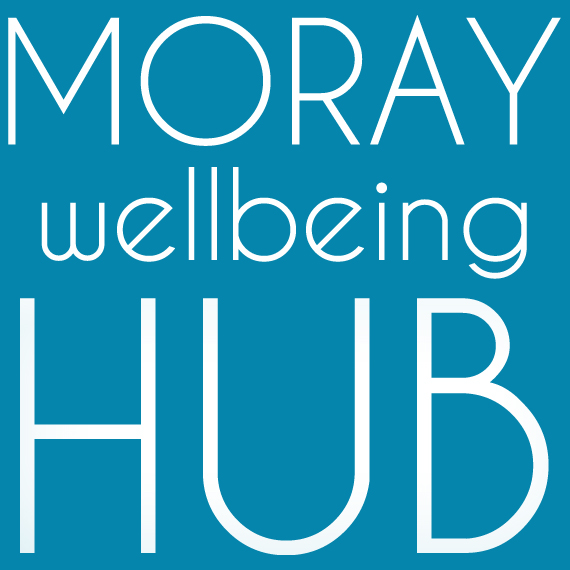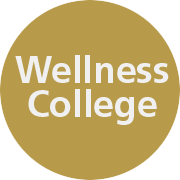This reflection is a combined effort from six MWH Champions, thank you to all who took the time to reflect on this key event for Moray Wellbeing Hub.
Recovery Colleges are a hot topic in the world of mental health. This term for an environment where people learn self-care. Recently we were invited to Glasgow by the Scottish Recovery Network, SRN, to attend a day-long conference on the subject of ‘Recovery Colleges’ at the Radisson Blu Hotel. The main activity would be two ‘conversation cafes’ with 5 speakers presenting ‘PechaKucha 20×20’ presentations (20 slides, 20 seconds each). (See more at http://www.pechakucha.org)
After opening remarks we self-selected tables to sit at and have our first ‘cafe’. The topic was, “If Recovery Colleges are the answer what was the question?” Each table had a guide to keep us on track and we were encouraged to write on the paper tablecloths and doodle ideas as we went along. At my table, we were joined by a graphic artist who was taking minutes of what she heard around the room in sketch/cartoon form. Her final drawing was an incredible representation of the day – much easier to get a feeling for how the discussions went that reading a report!
Next came the first Pecha-Kucha presentations. Each of the speakers had a different experience of delivering recovery based classes in a variety of funded and voluntary settings. These ranged from an NHS funded project in Liverpool to the long-standing work at the Maudsley Clinic in London, the Moray Wellbeing Hub (MWH), a project in Dublin and one from Glasgow.
Each of these speakers embraced the 20×20 challenge and the format made sure that each one was engaging and relevant. Heidi was very well prepared and her talk about the MWH journey seemed to inspire many in the room.
The second conversation cafe was a chance to reflect on the presentations and wonder if any of those had provided more answers to the first question. Once again, we split into self-selected groups and the discussion was heartfelt and lively from all parts of the room.
During the day, I was thinking more and more about how different Scotland has become in its approach to empowering the people to make changes for themselves. The news recently has been more stories of land reform and community buy-outs of property. I was thinking of these in conjunction with the mental health of the nation and the concept of recovery. It struck me that one by-product of these reforms is that we feel a greater connection and control over our lived environment and that this, in turn, contributes to an improvement in mental wellbeing. I talked to a few people at the event about this and although they agreed that it might well be the case in more rural areas, such as Moray, this effect might not be felt so strongly in the larger towns and cities… yet.
A very positive and inspiring day and it was good to meet up with others who are working towards making recovery a real phenomenon for everyone.
Ewan, MWH Champion.
Our table had a preponderance of Academics, who provided an interesting and new (to me) perspective and soundbites…
- ”Depression is a 100% human experience rather than the 1 in 4 figure often quoted”
- “People having services done to them and recovering in the bin”
- “Different form of community generally known as a Recovery College”
- “Not just lifelong but lifewide learning”
We then heard from a guest who described the effect of Homework Clubs on the whole family where the Tutors were not only helping the children. I saw an opening there in Moray for our Family Wrap, to provide a holistic service, paid for by a cost-astute education dept. The same guest also was of the opinion that “the people who commission services were 15 years behind the curve”
A speaker from the Midlands described their system… whilst echoing the previous speaker, “Authorities are looking for a silver bullet in a model that has been proved to work”
But held out hope for the future…
“Community development supports communities to support individuals in that community…’Compassionate communities’”
The next speaker then reminded us that, “mental health is still to be normalised” and recommended, “apply CHIME to the process” and that “we have to break people out of their boxes to have true co-production”.
They were followed by a very enthusiastic and charismatic speaker from Dublin who described their College which was actually hosted in Dublin University, but not part of it. He attributed the success and popularity of their Recovery College to “A Trialogue, a dialogue between the Steering Committee, the Working Group and the Students” although overall initiatives were student-led. He also stressed the place that CHIME has in their operations and showed that they had a variety of co-production styles.
Mersey Care Life Rooms presented next, and explained an approach which Mersey NHS had taken which was to use beautiful old buildings to inspire people to own their local recovery colleges by making the community proud of them, a method being used locally at Phoenix Centre in Buckie.
Turning Point Scotland continued the theme of community pride by describing their vision of citizenship which they embodied by calling their students “Citizens”.
Glasgow Kelvin College contributed some more thought-provoking soundbites
“What is the cost of not doing this thing?”
“Citizenship vs Kinship, citizenship can be imposed on you, kinship is what you have naturally”
… they were also quite adamant that Recovery Colleges must be part of FE Colleges, and must give out accreditation; a somewhat controversial view, but certainly one of a multitude of answers given to the questions.
All in all, this was a very good and successful seminar that SRN hosted, and on a practical note, the SRN hosting skills deserve special mention, we were looked after very comfortably and fed very well indeed.
Chris R., MWH Champion
I attended this SRN event in Glasgow in early November this year. It was exciting to get the opportunity to see what was going on in other areas and also give an opportunity to get feedback from what’s working well and what’s not!
From the five presentations on the day I felt that the majority of the “colleges” showcased still appeared to be service powered and the imbalance for those involved remained……this was only my perception and as such with the short presentations it was difficult to get a real feel for the models only the perception and delivery of those who delivered it.
The Dublin and Moray models both differed from my perspective. The power balance projected as an equal playing field for all involved.
The discussions around the table varied and it generated much discussion whilst also presenting us with challenges to find out what the questions are.
I have highlighted some of my notes below from the event which captures the main points for me within the group reflections.
- Move from repair to recovery……this statement I find challenging in relation to “what came first” whose interpretation? Surely, we are in constant repair? Who decides when we are broken?
- Hope- control-opportunity – I liked this statement as long as everyone gets to own their own.
- Whoever pays holds the power – this created a colourful discussion where finances automatically gave the power.
- The location where the “college” is has a massive impact on the perception, association and possibly usage of it.
- The use of wording was important and we discussed how this could exclude people creating an invisible barrier.
- The human approach to sharing and information was the best formula but other forms can support and run alongside.
My lightbulbs –
- Always direct contact for best impact for all (Human Dropbox)
- Slow and steady shift in culture/stigma – constantly moves and attaches to the wording used by those in the “business”
- Limited branding which becomes a national/international symbol for support and a sign used rather than words
- Needs to be accessible/universal/on everyone’s doorstep
Laurie Anne, MWH Champion
‘A journey of a thousand miles, begins with a single step’ – Chinese proverb
– (or that’s how it feels when travelling with Scotrail.)
We had travelled to Glasgow on Tuesday afternoon 7th November 2017 by Scot Rail, which again was on its “go slow and all stop” which seems to be becoming a habit for the Champions of the Moray Wellbeing Hub, who all manage to get to the train stations on time, but the trains always seem to be hours late at arriving or returning to where we came from, or leave without us because of the connection being missed due to our ‘slow’ trains.
The discussion began with an agreement that the colleges not be called “Recovery”, in my interpretation “recovery” to me means ‘recover from an illness’, whereas the values that I have acquired within the Moray Wellbeing Hub, relate to my wellbeing and health daily, not an illness, e.g. these would be the stages that people move through in our lives to a greater or lesser degree depending on their wellness.
The next exercise was on a Conversation Café and feedback from our tables, the discussion began with references to other people who run colleges, and they explained how the college works for them – I was very interested to hear others opinions and comments. We then broke for lunch.
Later we had presentations, unfortunately, the first people to speak had been unable to attend so we watched a video which they sent. The video was informative and good. We then had the following people speak about their organisation, what happens there and how they came into existence, including Heidi talking about the Moray Wellbeing Hub.
Each person who spoke was passionate about the achievements and outcomes that have occurred for them, and in providing access to a college for others. I enjoyed this part of the afternoon, as it gave examples of what can be achieved. However, it’s far from a walk in the park, commitment, insight and careful thought, along with challenging workloads, would come in to play.
We then had another Conversation Café with feedback at different tables from the first one. Hearing other people’s interpretations and information was enlightening, and how other perceptions and outcomes resonate with the same values that we have in the Moray Wellbeing Hub. Finally, the event ended with a panel of speakers from the day, giving us the opportunity to ask questions and hear their answers.
In hindsight, being part of the Moray Wellbeing Hub, I have learned about things I never thought I would, the idea of the hub, eventually having its’ own college is exhilarating and challenging for every Champion we have, including me. I am looking forward to the day this eventually happens, and trust that we all embrace the challenges that are in front of us and use the knowledge and passion we all have to create change, for ourselves and others!
Ailene, MHW Champion
I was delighted that the Moray Wellbeing Hub could be part of this event, however being invited to deliver my first Pecha Kucha required a massive amount of preparation; being succinct about what we do and why provided and excellent, if time-consuming, opportunity to reflect on our journey and be clear about what really makes us tick.
Nerves about my own presentation aside, the event was very exciting and very useful for us at the MWH. We came down as a group of six to attend the event which gave us all a great opportunity to bond as supportive individuals and mull over much of the hub’s work during the travel and stay over. Indeed, one of the themes that started to emerge in these discussions was around this idea of the ‘liminal’ or ‘in-between’ space is more important to wellbeing and recovery than the main event. Many of us had experienced the most powerful inspiration coming from the side conversations over a coffee or waiting at a bus stop. Certainly, this may not have been a key focus for the event, but a side topic that we at the hub will return to…watch this space!
The event itself provided some excellent networking opportunities for us as Champions at the hub, all of us have our own side projects, key focuses and skills, so when we attend events it’s very much down to individuals how much and what they look to discuss with others – there is no big PR of party line aside from our values on how we treat ourselves and others. That is why we have such varied reflections and, I think, one of the things that make us attractive as a group to invite to such events; you get some very engaged and enthused people, but also a wide variety of opinions and expertise.
This event was the first of three in November and December 2017 that I had been invited to as a speaker to share the MWH vision and journey. Whilst I have presented to groups before it has not been to audiences of this calibre out with our local area. Simply being asked to present in a lineup of the leading players in the recovery movement both nationally and European is exciting and proves that we are on the right path in Moray. It is also a great opportunity to value and thank the many Champions, partners and supporters who have contributed to our journey thus far. What made it possible for me to present so passionately, was having Champions from Moray in the audience, keeping me grounded and not taking the praise for the hub ideas and progress personally – thanks, guys!
The response we received for our ideas was very strong, especially from my fellow speakers. I could see many common threads with their projects and organisations, each having individual and local opportunities and challenges that prevent straight comparisons between us all. Indeed, collaboration not competition is the aim and already we have been in email contact with some of the speakers to look at partnership work in the future. Brilliant stuff to look forward to in 2018 and thanks to the SRN yet again for supporting us to have this opportunity.
To watch and listen to the Pecha Kucha presentations from the event, check out the SRN’s Resources webpage and download it from there. https://www.scottishrecovery.net/resources/
Here are some of my key notes from the event:
- Frank SRN: “Distress is 100% experienced by people, it belongs to all of us” “Recovery and coproduction do not save money” “We are the resource”.
- SLaM presentation: Model is to move from “repair to recovery”. They see 450 people per term.
- John from Dublin Recovery College, one of 5 in Ireland networked nationally. Students voted not to bother with a winter term (weather/mood?). Structure very important, everyone suggests courses, a different approach to others – need to prove self.
- Gary, Life Rooms Mersey Care: 2013 had a recovery college using community rooms, no clinicians in the spaces.
- Use beautiful spaces show people they are well invested in.
- Trade and barter “groats & turnips” – trade without cost for 95% partnerships.
- Dropped the word peer – “we are all colleagues”
- Wanted to reduce dependency “life after Life Rooms”
- Craig Winter, Turning Point: Citizenship “recognize people as citizens” want to make a big noise about citizenship.
Next steps for me will be to use these new contacts and ideas to further our partnership approach to the ‘Wellness College’ approach we have set up in Moray, where we (the MWH) act as the host, connector or promoter for other great courses and events in the area that meet our values, as well as put some on ourselves.
Heidi, MWH Champion
was lucky enough to attend the above Scottish Recovery Network conference in Glasgow last year. I really liked the atmosphere of this conference, although there were quite a few dynamic, well informed and engaging speakers there was a sense of mutuality and equality in the room. It felt everyone really embraced completely the notion of peer and I felt the was more health in the room as a result, every question was valued as was every person.
There were speakers from Turning Point Scotland, The Liferooms on Merseyside, John Kelly from Dublin North, SLAM recovery college London and Heidi representing us at The Wellbeing Hub. Each of the speakers had a 20 slide presentation that they had to deliver each slide in 20 seconds. This proved quite a challenge but was amazing how much information was covered.
I really enjoyed this conference particularly the discussions. We grappled with defining recovery and all that recovery means at the same time there seemed to be an agreement in the room that the term recovery 20 years ago was a radical notion that recovery was possible and was a term then that has brought us to here and there has been amazing advancements in the evolution of recovery and peer. However, language is very important and the term recovery according to a lot of people in the room, seems to be in need of review as ‘recovery’ invites in limiting language of polarities and duality, like right or wrong; good or bad; fixed or broken; them or us. Accepting we are all capable of right, good, bad, fixed and broken thinking and actions on a continuum. Not fixed for all time. We are all humans with human frailties and experiences, not too attached to any definition. Continual enquiry on what works in all things including language is required to keep engagement and vitality. I enjoyed a lively discussion introduced by Craig Winter of Turning Point Scotland around the word citizenship and the broad-reaching courses around equipping people to feel part of society as apposed to recovery college model.
Even the word peer was actively being replaced by colleagues in The Liferooms in Merseyside as part of their vision of offering courses and experiences and not dependancy culture.
I feel this discussion on language is vital to keeping authenticity and vitality and therefore evolving services to meet the needs of people now.
This is an area of interest for me so I took the look at language one step further and looked at Kinship v Citizenship ( maybe coming from an idealistic place, but who cares). To me, Kinship is about community members and is what we have in common as people, what connects us, what we share. Coming from a place of human needs are universal. Compared to Citizenship, which to me is moire about society from a political view point, and conjures up for me words like compliance, hierarchy; political bias and box ticking.
Anyway, I felt privileged to be in the room and part of the discussions as I feel this is crucial in assessing what is required now that may be different from what went before.
Marion, MWH Champion






